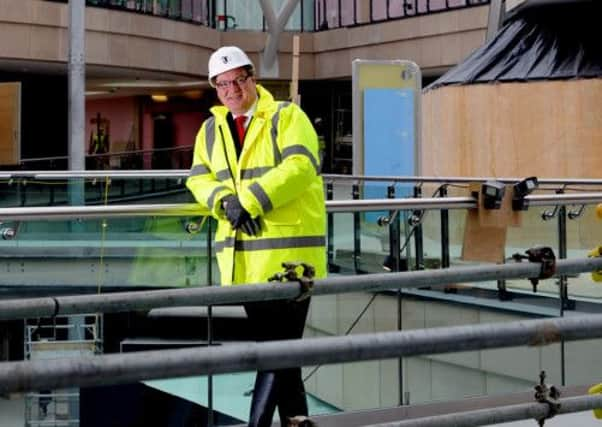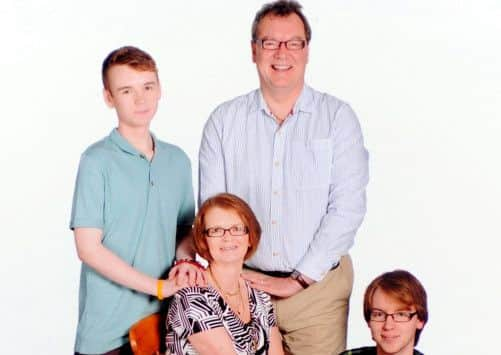Family nightmare of the man behind Trinity Leeds


Visions were outlined, hands were shaken and contracts signed – by 2007 it was all systems go for the £350m project set to be Leeds city centre’s largest development in almost a quarter of a century.
Trinity was always a big deal, even before the credit crunch started to bite into the confidence of corporations nationwide. But by the time the recession hit, its success or failure became a symbol of the city’s future prospects. Within two years, as similar ventures were shelved, it was the only retail and leisure scheme of its kind being built in western Europe.
Advertisement
Hide AdAdvertisement
Hide AdSadly, 2007 was also the year that the man charged with delivering this mammoth project was told that his son had one of the most severe forms of leukaemia. Gerald Jennings, Land Securities’ retail portfolio director, had to juggle twin trials – making sure a scheme worth more than a third of a billion pounds came to fruition and helping 15-year-old Matthew fight for his life.


“If you rate the severity of the leukaemia from one to 10 it was knocking on the door of 10,” says Jennings “So it was definitely among the worst. We’d noticed him being a bit lazy and listless and then my wife, Sue, spotted these blemishes coming through on his face. We took him off to the doctor who was concerned straight away. Then, after tests, it was literally a case of, ‘Pack your bags – there’s a bed waiting for you this afternoon at St James’s Hospital’.”
Treating the acute lymphoblastic leukaemia required three years of treatment. This included, initially, months of intense chemotherapy which saw Matthew’s mother virtually live with him at Jimmy’s.
Inevitably, the chemotherapy saw his hair fall out, his weight plummet and he suffered multiple fractures as his bones became unusually brittle. He was in and out of hospital for most of the first year, with mad dashes from the family home to Beckett Street the moment he showed any sign of relapse.
Advertisement
Hide AdAdvertisement
Hide AdDuring this time, Jennings had to hold down his job while making sure he was on the teenage cancer ward at 4pm every day. Then he would return to the family home since their daughter, Hannah, was still at school at the time and needed looking after. Their eldest son, Daniel, was at university in Cardiff.
It was almost unbearable. But Jennings coped, mostly.
“I went to pieces on the day he was diagnosed,” he says. “Which might surprise people who know me because many of them will see me as this big, straight-talking, adopted Yorkshireman. People use the term ‘devastating’ all time, but it truly was.
“I went to pieces more than my wife actually. Sue was the one who said: ‘We’ll get through this together’ and I think that’s the case in a lot of families actually – the women are rocks. But it’s something that’s unspoken in a way.
“I just felt helpless. I’d lost control. I’m used to being in business where you decide what happens, but we were completely in the hands of others. I didn’t tell a lot of people inside the company about Matthew, just those that really had to know. Among them was a colleague in our London office whose daughter had been in the same situation. She gave me an invaluable piece of advice: view this period of your life as a project. Sit down and say: ‘This is where we are, and this is where we need to be. Now, how do we need to get through this?’
Advertisement
Hide AdAdvertisement
Hide Ad“And that worked for me. Without being dispassionate, I had to say to myself: ‘If Sue is in hospital with Matthew, how are you, Gerald, going to deal with things at home, and how are you going to do your job as well?’ But it didn’t always work, there were a couple of times when I lost it, but we got there in the end.”
After 12 months, Matthew came home for good and the chemotherapy started to have its desired effect. He regained his hair and the weight he’d lost and he managed to achieve the GCSEs and A-levels required to go to Northumbria University with plans of following his father into property. After three years of treatment he was given the all clear and life returned to normal.
But at the age of 55, Jennings is now a changed man.
Coming from a long line of traditionally Tory farmers in North Wales, he entered the Thatcher years a twenty-something, Maggie-loving yuppy complete with briefcase and personal organiser. He had a gritty upbringing milking cows and picking potatoes (he was actually born on his father’s dairy farm and, at the age of 21, ran it for a year), so arriving in Leeds to handle a property portfolio for the Burton group was a glamorous step up.
His first taste of the high life was “drinking champagne and eating salmon sandwiches in a casino in Moortown” That was 1985 and for the next 20 years he lived in what he admits was “a bubble of business”, first with the clothing giant and then, in 1999, with property developers Land Securities.
Advertisement
Hide AdAdvertisement
Hide AdBut Matthew’s near-death experience was a leveller which made Jennings realise that no matter how much you try to control life, we are all, to varying degrees, at the mercy of circumstance and fate. We all need a little help sometimes too.
“I came out of that whole period stronger but also with a very different view of life,” he says. “You become more understanding of what other people may be going through. I remember when we were at St James’s there was a little girl in the bed next to us one day, then the next day she was gone. She hadn’t survived her cancer. That really puts things in perspective.
“My politics have changed too. I was brought up through the Tory years and they were great for me as a young guy in business. Then we had our experience with Matthew and you think: ‘There has to be more to life than businessmen in pinstripe suits, loud ties and flash cars. There’s more things that make the world tick.’
“But for Tony Blair, I might be more of a Labour man now. This ‘Big Society’ idea, I actually get it, even though I know a lot of people don’t. It’s interesting that it came from David Cameron, not a Labour politician. And I also get this idea that we are all in this together.”
Advertisement
Hide AdAdvertisement
Hide AdIn 2005, Jennings and his team set up the Arise project within Land Securities which awarded the company’s cash to various worthy causes around the city. The move was partly a response to unhappiness expressed by local communities surrounding the business’s other interest, the White Rose Shopping Centre in south Leeds.
But following the Jennings’s family ordeal he stepped up their work. Over the past eight years the company has handed out £400,000 to more than 210 organisations. They range from £18,000 to help stage the Middleton bonfire, to £110,000 for Martin House children’s hospice, near Leeds. And they plan to keep going too.
But does this giving just amount to PR from corporate giants with cash to splash? Jennings insists not. He points out the fact that the company lends its services and time to community groups which can’t be valued in mere pounds. Jennings will personally give up his evenings to help too.
“There aren’t many businessmen who would spend their spare time engaging with people who they don’t actually have to engage with,” he says “It would be as easy to say: ‘I’ll just write a cheque’ but it’s about going that extra step – and I do that.
Advertisement
Hide AdAdvertisement
Hide Ad“Besides, if people looked at what we’ve done over, say, a 10-year period they’d see we’ve done it because its the right thing to do not because it’s a short-term PR stunt. The evidence is just there.
“Now Arise is being rolled out to other Land Securities schemes across the country, but my advice to them is that you have to have a champion, someone who is the face of what you’re trying to achieve. And that’s the role I’ve tried to fulfil in Leeds.”
Is the work of Arise a direct result of Jenning’s influence and his experiences of his son’s illness? “I’m in danger of being immodest here,” he says “But if you press me then the answer is ‘yes’ and ‘yes’.”
There are now less than five weeks to go before Trinity opens its doors between Briggate and Boar Lane. The launch is the culmination of six years of laborious work creating a one million square foot scheme in the middle of one of the worst recessions in history.
Advertisement
Hide AdAdvertisement
Hide AdThe results promise to be impressive, with the arrival of world-class brands like Hollister and Apple, not to mention an upmarket D&D restaurant, Crafthouse, and a boutique cinema. More importantly, Trinity Leeds will substantially nudge the city up the UK retail rankings.
But despite such an achievement, the project itself doesn’t represent Jennings’s proudest moment – something he might have felt differently about six years ago.
“I’m most proud of how I’ve established Land Securities as an organisation which is well respected in Leeds,” he says. “And I don’t think we had that before – I think we were viewed as a successful London-centric business.
“But over the last 10 years changing that into a business with a human face, is what I’m most proud of.”
Curriculum Vitae
Born: Whitford, North Wales, February 27, 1957.
LIVES: Harden, near Bingley.
Advertisement
Hide AdAdvertisement
Hide AdFAMILY: Wife, Sue. Three children: Daniel, 24, Matthew, 20, and Hannah, 19.
EDUCATION: 1968-1975 St Richard Gwyn School, North Wales; 1975-1978 Bristol Polytechnic (BSc Valuations and Estates Management).
CAREER: 1979-1985 Liverpool City Council; 1985-1999 Burton Group; 1999-present Land Securities.